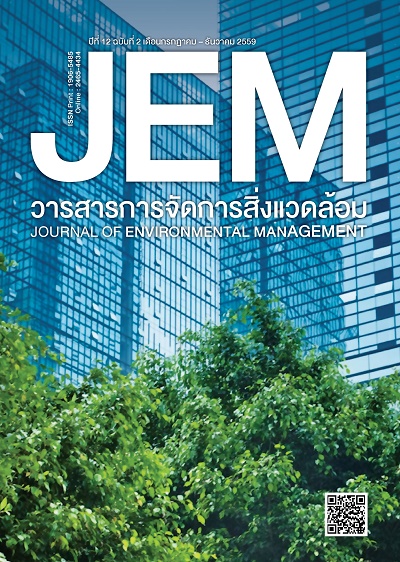การบริหารจัดการชีวิตของประชาชนในมิติด้านสิ่งแวดล้อม Green Governmentality
บทคัดย่อ
รัฐในปัจจุบันได้ปรับเปลี่ยนระบบความสัมพันธ์ทางอำนาจที่มีต่อประชาชนใน มิติด้านสิ่งแวดล้อม จากนโยบาย ที่เปิดโอกาสให้ประชาชนมีพื้นที่จัดการป่าภายในอาณาบริเวณที่รัฐวางแนวทาง ไว้ อันเป็นช่องทางที่ทำให้อำนาจแทรกซึม เข้ากำกับชีวิตของประชาชนอย่างเป็นธรรมชาติ จากการเข้าไปวางแนวทางการดำเนินชีวิตของประชากรทางอ้อมหรือ การปกครองในระยะทางไกล ผ่านกลไกที่เสริมสร้างความเชื่อมั่นว่าประชากรสามารถปกครองตนเองได้ ด้วยการส่งเสริม ให้ชุมชนจัดตั้งคณะกรรมการป่าชุมชนขึ้นมาทำหน้าที่กำกับดูแลการจัดการสิ่ง แวดล้อมของตนเอง ชุมชนจึงมีศักยภาพที่จะจัดการป่าตามทางเดินของตัวเอง เพราะพวกเขามีระบบการจัดการซึ่งเป็นกระบวนการที่สร้างตัวตนผู้รู้คิดเรื่อง สิ่งแวดล้อมของเขาขึ้นมา บทความนี้จะแสดงให้เห็นว่าการจัดตั้งคณะกรรมการป่าชุมชนเป็นเทคนิควิธีทาง การปกครองที่เข้ากำหนดให้ชาวบ้านในเขตป่ามีความรู้สึกนึกคิดเรื่องสิ่งแวด ล้อมจากวิถีการจัดการป่าที่เป็นตัวของตัวเองเอกสารอ้างอิง
Agrawal, A. (2005). Environmentality: Technologies of Government and the Making of Subject. Durham: Blackwell Publishing.
Burchell, G., Gordon, C., & Peter, M. (1991). The Foucault Effect: Studies in Governmentality. London: Havester Weatsheaf.
Dean, M. (2010). Governmentality: Power and Rule in Modern Society (2 ed.). London: Sage Publications.
Foucault, M. (1978). The History of Sexuality, Volume I: An Introduction. New York: Pantheon Books.
Foucault, M. (1980). Two Lectures. In C. Gordon (Ed.), Power/Knowledge Selected Interviews and Other Writings 1972 - 1977 Michel Foucault (pp. 78 – 108). New York: Pantheon Books.
Foucault, M. (1991). Governmentality. In G. Burchell, C. Gordon & P. Miller (Eds.), The Foucault Effect: Studies in Governmentality (pp. 87 – 104). London: Harvester Wheatsheaf.
Foucault, M. (2008). The Birth of Biopolitics: Lectures at College De France 1978 - 1979. New York: Palgrave Macmillan
Gordon, C. (1991). Governmental Rationality: An Introduction. In G. Burchell, C. Gordon & P. Miller (Eds.),
The Foucault Effect: Studies in Governmentality (pp. 1 – 51). Hemel Hempstead: Havester Weatsheaf.
Hunt, A., & Wickham, G. (1994). Foucault and Law: Toward a Sociology of Law as Governance. London: Plato Press.
Luke, T. W. (1995a). On Environmentality: Geo-Power and Eco-Knowledge in the Discourses of Contemporary Environment. Cultural Critique, 31, 57 - 81.
Luke, T. W. (1995b). Sustainable Development as a Power/Knowledge System: The Problem of “Governmentality”. In F. Fisher & M. Black (Eds.), Greening Environmental Policy: The Politics of a Sustainable Future (pp. 21 – 31). New York: St. Martin’s Press.
Luke, T. W. (1999). Environmentality as green governmentality. In E. Darier (Ed.), Discourses of the environment (pp. 121 – 151). Oxford: Blackwell Publisher.
Malette, S. (2010). Green governmentality and its closeted metaphysics: Toward an ontological relationality. Doctoral Thesis, University of Victoria.
Markula, P., & Pringle, R. (2006). Foucault, Sport and Exercise: Power, Knowledge and Transforming the Self. New York: Routledge.
Murdock, J., & Ward, N. (1997). Governmentality and Territoriality: The Statistical Manufacture of Britain’s "National Farm". Political Geography, 16(4), 307 - 324.
Rutherford, S. (2007). Green Governmentality: Insights and Opportunities in The Study of Nature's Rule. Progress in Human Geography, 31(3), 291 - 307.
Seub Nakhasathien Foundation. (2015). The situation of Thai Forest 2015 [In Thai: รายงานสาธารณะ สถานการณ์ป่าไม้ไทย 2558]. Retrieved May 9, 2016, from http://www.oknation.net/blog/rawangphrai/2015/09/02/entry-1.
Skinner, D. (2007). Organizing organic: A Foucauldian analysis of the regulation of organic food production. Doctoral Thesis, Warwick University.
Wongyannava, T. (1989). The Subject Analysis—The Theory of Power Theory by Michel Foucault. [In Thai: การวิเคราะห์ซับเจค (Subject) ทฤษฎีที่ใช้ทฤษฎีว่าด้วยอำนาจของมิเชล ฟูโก]. Bangkok: Department of Political Science, Thammasat University.



